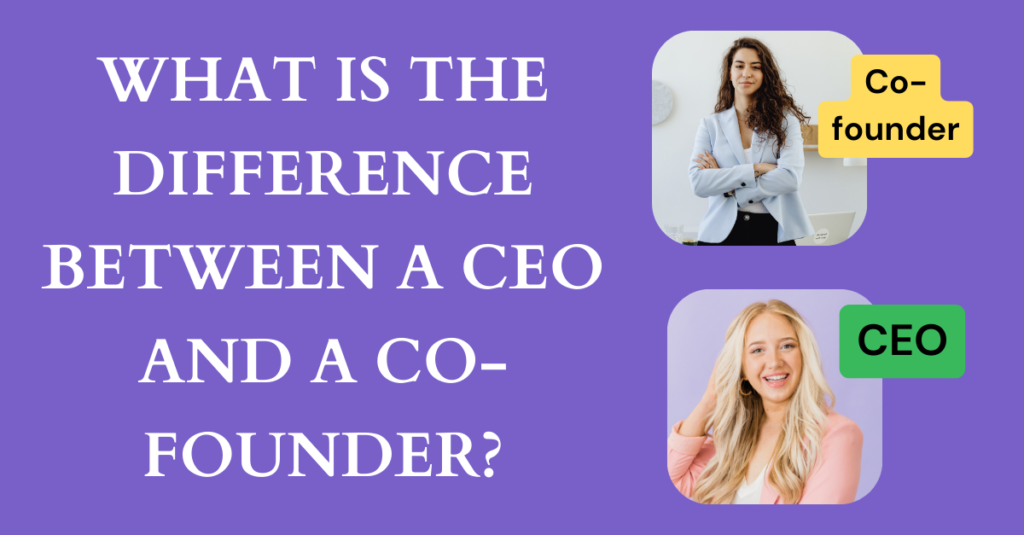What is the Difference Between a CEO and a Co-founder?
Introduction
In the vast and intricate realm of business, the titles of CEO and co-founder are often used interchangeably, leading to misconceptions about their respective roles and contributions. While both positions are vital to the success of a company, they carry distinct responsibilities, origins, and areas of expertise. Understanding the differences between a CEO and a co-founder is crucial for comprehending the dynamics that shape the trajectory of startups and established enterprises alike. In this article, we will delve into the unique attributes that set these roles apart, shedding light on the divergent paths that lead to their positions and the crucial contributions they make to the organizations they lead.
- I. The Roles Defined: CEO and Co-founder
To comprehend the differences between a CEO and a co-founder, it is essential to first define each role:
A. CEO (Chief Executive Officer)
The CEO, or Chief Executive Officer, is the top-ranking executive in a company, responsible for making major corporate decisions, managing resources, and ensuring the overall success and growth of the organization. Their role involves strategic planning, overseeing daily operations, and providing leadership to various departments. CEOs report to the company’s board of directors and are accountable to shareholders and stakeholders for the company’s performance.
B. Co-founder
A co-founder is one of the individuals involved in the inception and establishment of a company. They are among the group of people who come together with a shared vision to create a business. Co-founders typically play a crucial role in the early stages of the company’s development, contributing their expertise, resources, and passion to shape the startup’s foundation. While not all co-founders may hold executive positions, their role is fundamental in shaping the company’s culture, mission, and initial growth.
- II. Key Differences Between a CEO and a Co-founder
A. Origin and Inception of the Roles
The most fundamental difference between a CEO and a co-founder lies in the origins of their roles within the company.
- CEO: The CEO is usually appointed or hired by the company’s board of directors or shareholders. Their selection often comes after a thorough search and interview process to find a candidate with the right qualifications, experience, and vision to lead the company effectively.
- Co-founder: Co-founders are instrumental in the creation of the company. They are part of the group of entrepreneurs who come together with a shared idea or goal, and they actively contribute to the company’s formation, often providing the initial capital, technical expertise, or intellectual property.
B. Authority and Decision-making
The CEO and co-founder also differ in terms of their decision-making authority.
- CEO: The CEO holds significant decision-making authority and is responsible for charting the company’s strategic direction. They have the final say in many operational and executive-level decisions and are accountable for the outcomes.
- Co-founder: Co-founders, especially in the early stages, often participate in decision-making collaboratively. While they may hold influential roles, their decision-making power may not be as absolute as that of the CEO. As the company grows and more formal structures are established, co-founders may shift their focus to specific areas of expertise, relinquishing some decision-making authority to the CEO.
C. Responsibilities and Daily Operations
The CEO and co-founder have distinct areas of responsibility within the organization.
- CEO: The CEO is responsible for the overall management of the company and ensuring its success. They focus on strategic planning, goal-setting, financial management, and overseeing the execution of key initiatives. They also represent the company to external stakeholders, such as investors, customers, and partners.
- Co-founder: Co-founders, especially in the early stages, are often more hands-on and involved in various aspects of the business. They may be responsible for product development, marketing, sales, or other critical functions, depending on their areas of expertise. As the company grows, co-founders may transition into more specialized roles or take on advisory positions.
D. Accountability and Ownership
The CEO and co-founder differ in their levels of accountability and emotional attachment to the company.
- CEO: The CEO is accountable to the company’s board of directors and, ultimately, to the shareholders and stakeholders. They may be hired or replaced based on the company’s performance and their ability to lead effectively.
- Co-founder: Co-founders often have a strong emotional attachment to the company, as they were instrumental in its creation. They may hold significant ownership stakes, which align their interests with the long-term success of the business. However, their level of accountability to external stakeholders may vary, depending on their executive roles and involvement in the company’s ongoing operations.
- III. The Relationship Between a CEO and a Co-founder
In successful companies, the relationship between the CEO and co-founder is crucial to the organization’s growth and sustainability.
A. Collaboration and Synergy
Ideally, the CEO and co-founder work together harmoniously, leveraging their complementary skills to drive the company forward. Co-founders, with their intimate knowledge of the company’s history and culture, can provide valuable insights to the CEO, who brings strategic leadership and operational expertise to the table. This collaboration can lead to better decision-making and a cohesive vision for the company.
B. Potential Challenges and Conflict Resolution
However, conflicts between the CEO and co-founder can arise due to differences in vision, strategies, or the direction of the company. Disagreements over critical decisions can strain the relationship and impact the organization’s performance. In such situations, open communication, mutual respect, and a shared commitment to the company’s success are essential to resolving conflicts constructively.
- IV. Transitioning Roles: Co-founder to CEO
As companies evolve and grow, the transition from a co-founder to a CEO may become necessary for the company’s continued success.
A. Recognizing the Need for Change
As the company scales, the demands on leadership change, requiring a more structured and experienced approach to management. Co-founders must recognize when their skill set and experience may no longer match the company’s needs.
B. Finding and Onboarding a New CEO
Transitioning from a co-founder-led company to one with a professional CEO can be a delicate process. Finding the right candidate who aligns with the company’s values and long-term vision is critical. Co-founders must be involved in the onboarding process to ensure a smooth and successful transition.
- V. Case Studies of Successful CEO and Co-founder Relationships
Numerous successful companies have navigated the CEO and co-founder relationship effectively. Analyzing their experiences can provide valuable insights into how this collaboration can contribute to a company’s growth and stability.
Conclusion
In conclusion, while both a CEO and a co-founder play crucial roles in the success of a company, their responsibilities, origins, and decision-making authority significantly differ. Understanding the distinctions between these key figures is vital for establishing effective leadership, fostering collaboration, and guiding the trajectory of a business. By recognizing the unique attributes of CEOs and co-founders, organizations can leverage their diverse skills to drive innovation, adapt to challenges, and achieve enduring success in the competitive world of business.

My name is Rohit Vagh and I’m a content writer specializing in fashion and lifestyle. I have three years of experience in this field and have written various articles. My writing style is creative and engaging, and I strive to create content that resonates with my readers. I have a deep passion for fashion and am constantly researching the latest trends and styles to make sure my readers are up to date. I’m excited to continue my career in blogging, and I’m always looking for new opportunities in the fashion and lifestyle space.





